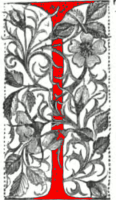Dallas here brilliantly anticipates Ivins, McCluhan, and the Toronto school of information technology theorists by a century. — George P. Landow

t is curious to note how as in successive ages literature receives a fresh impulse, although that impulse is merely mechanical, yet the effects both on literature and society have all the potency of a revolution. Take for example the first invention of an alphabet—the results were tremendous. Literature, which before had been entirely metrical, since it is only metrical compositions [309/310] that could be preserved in the memory, then admitted of prose and all the simplicity and truthfulness which prose implies. On the other hand, society, accepting the gift of letters, found ere long that it had unconsciously accepted the creation of a learned class, that a priesthood in the worst sense rose where there was no priesthood before, and that its power was enormously increased and abused where previously it had been limited and just. The invention of letters thus unfettered literature while it fettered society; it furnished a lamp to knowledge and a dark lantern to religion; it was a secret which, like the Open Sesame of the fable, gave riches to them that knew it, and, it might be, death to them that knew it not. Slowly but surely the secret became more and more known, until at length the art of printing gave it a diffusion which was before impossible. Immediately we observe a remarkable effect both on literature and on society. In literature the paucity of readers and the habits of a learned class had encouraged throughout Europe the neglect of native dialects, and had created a sort of universal language. Authors, anxious to address the largest number of readers possible, very naturally wrote in Latin, which thus became the hero of speech. But, as the invention of of printing increased the number of readers, it very soon became evident that even in his [310/311] mother-tongue an author could find an audience worthy of his ambition. Hence the gradual neglect of Latin in each country, and the increased cultivation of the vernacular, until at length the European literature settled into the form which it now bears. The individual withered: there was no more a great hero-language. But the individual also prospered: for languages hitherto neglected sprung into note. And the effect on society was not less striking than the effect on literature. The deliberate culture of a national literature is of itself a social revolution: but a revolution not less important was produced by depriving the European priesthood of what had for ages been their almost exclusive possession. Letters were no longer a scholastic cabala; the mediaeval distinction between clerk and lay was nullified; the priesthood of Western Europe, ceasing to be the exclusive owners of an art that was to the multitude like a wondrous charm, lost a mysterious power, which was an outward and palpable sign of a Divine but imperceptible influence.
Now literature has in our day received an impulse and a development which may be described as not less extraordinary nor less revolutionary than the impulse and the development which it derived successively from the creation of an alphabet and from the invention of printing. We cannot indeed fix upon any one discovery [311/312] in the present century which may be compared for importance with either of these grand events; but we can point to the concurrence of a vast number of new applications and new arrangements that have tended to diffuse education, and not only to cheapen but also to improve and enrich books in a manner previously unexampled. The stereotype, the photograph, wood-engraving, the art of printing in colour, and many other useful inventions have been perfected—making the printed page within the last thirty years what it never was before. At the same time the railway and the steamship, the telegraph and the penny postage, by daily and hourly bringing near to us a vast world beyond our own limited circles, and giving us a present interest in the transactions of the most distant regions, have enormously increased the number of readers, have of themselves created a literature, and through that literature have had a mighty influence upon the movement of the time.
Bibliography
Dallas, Eneas Sweetland . The Gay Science. 2 vols. London: Chapman and Hall, 1866. A HathiTrust online version of a copy in the Harvard University Library. Web. 30 April 2022.
Created 30 April 2022
Last modified 23 January 2924